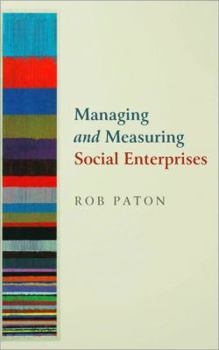Managing and Measuring Social Enterprises
Select Format
Select Condition 
Book Overview
Recent years have seen the voluntary and social enterprise sectors embark on a tentative love affair with performance measurement. We should, it seems, be measuring, monitoring and reporting our performance for a variety of reasons - accountability, continuous improvement and self-motivation, to name a few. But has anyone stopped to consider the realities if implementing the range of tools on the market? Author Rob Paton does just this′ - Voluntary Sector
Managing and Measuring Social Enterprises examines the question of what happens when performance improvement techniques originating in the private sector are applied to public and nonprofit organizations.
Managing and Measuring Social Enterprises looks critically at a range of performance measurements and improvement methods, including:
- Outcome measurement
- Using financial ratios for performance comparison
- Social audit
- Process benchmarking
- Externally accredited standards (like Investors in People′ and ISO 9000)
- Diagnostic models and other tools from the quality movements
- Balanced scorecards′
Rob Paton offers a measured critique of the na ve realism and rhetorical excesses of the performance management movement but also shows why many of its critics are unduly pessimistic.
Through a combination of theory and research, the book provides practical guidance to the problem of performance management outside of the private sector.
This is an essential text for those interested in public and social enterprises, particularly MBA and Masters students in public administration/public management and non-profit management.





